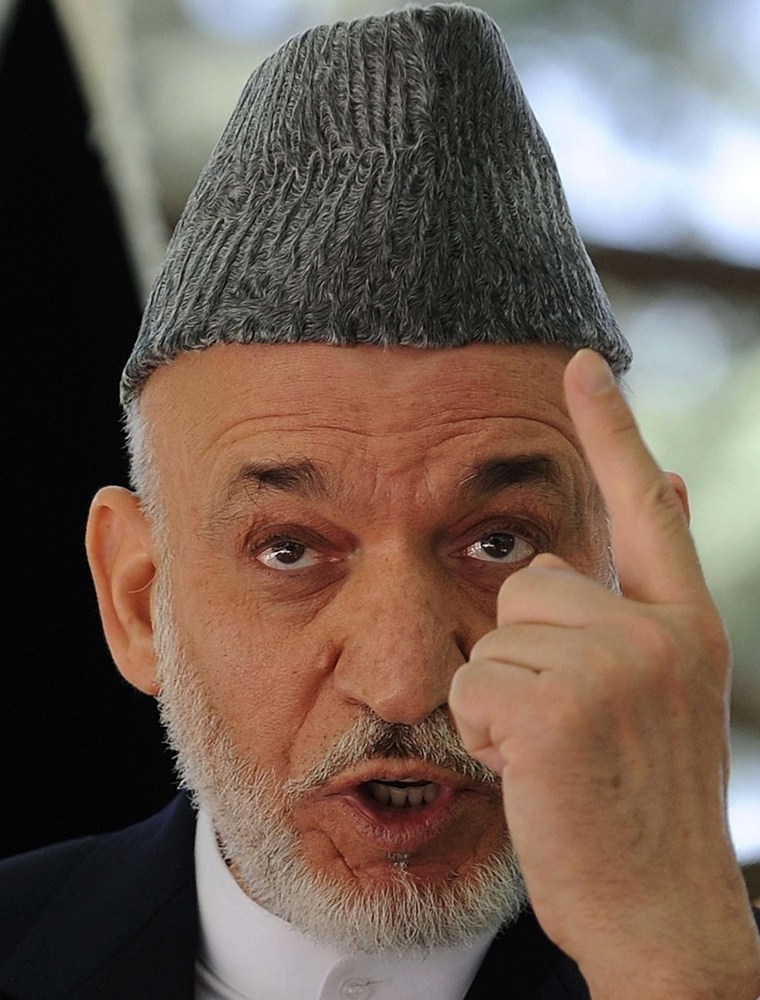Attacks on houses in Afghanistan would continue, NATO said on Tuesday, after an alliance airstrike over the weekend killed civilians and prompted harsh condemnation from President Hamid Karzai.
Ordering airstrikes is a command decision in Afghanistan, where NATO spokeswoman Maj. Sunset Belinsky insisted they would continue.
"Coalition forces constantly strive to reduce the chance of civilian casualties and damage to structures," Belinsky said. "But when the insurgents use civilians as a shield and put our forces in a position where their only option is to use airstrikes, then they will take that option."
In Brussels, NATO spokeswoman Oana Lungescu insisted NATO airstrikes are still essential. She said the alliance takes Karzai's concerns very seriously and would continue to make every effort to avoid civilian casualties. She said airstrikes on houses are coordinated with Afghan forces and "they continue to be necessary."
Meanwhile, the U.S. military said three of its service members were killed in a bomb attack Saturday in eastern Afghanistan. There was no explanation for the delay of several days in releasing the information. Often casualty reports are delayed in order to ensure that relatives are notified of the deaths beforehand.
What authorities do know of Saturday attack is that a Taliban suicide bomber wearing a police uniform blew himself up inside a heavily guarded compound in northern Afghanistan as top Afghan and international officials were leaving a meeting.
The blast killed two senior Afghan police commanders and wounded a German general in command of coalition troops in the region. Two German soldiers and two other Afghans were also killed in the blast that came just weeks before a planned drawdown of U.S. troops begins this summer.
The bomber detonated his explosives-laden vest inside the governor's complex in Takhar province, where high-ranking Afghan officials were meeting with members of the international coalition.
Among the dead was Gen. Daud Daud, regional police commander in northern Afghanistan. Daud was a former deputy interior minister for counternarcotics and a former bodyguard of Ahmad Shah Massoud, the charismatic Tajik leader who commanded the Northern Alliance and died in an al-Qaida suicide bombing two days before the Sept. 11, 2001, attacks that provoked the U.S. invasion.
'Occupying force'
Earlier, Karzai warned NATO forces fighting in his country that they risk becoming seen as an "occupying force" if they do not stop attacking Afghan homes with airstrikes as they hunt insurgents.
Karzai said he would no longer allow NATO airstrikes on houses because they have caused too many civilian casualties.
"If they don't stop airstrikes on Afghan homes, their presence in Afghanistan will be considered as an occupying force and against the will of the Afghan people," Karzai told a news conference in Kabul Tuesday. "From this moment, airstrikes on the houses of people are not allowed."
Taliban insurgents also use the phrase "occupying force" to describe the international coalition.
Karzai reacted angrily after the .
The strikes were ordered after a patrol had come under fire. Graphic television footage after the strikes showed grieving relatives holding the bodies of several children, including babies.
The commander of the NATO-led International Security Assistance Force (ISAF) later apologized for the deaths, saying the strikes on the compound had been ordered because insurgents were using them as a base.
It was the president's strongest statement against the strikes, which NATO says are a necessary weapon in the war against the Taliban insurgency.
Civilian casualties caused by foreign troops, usually in airstrikes or "night raids" on Afghan homes as they hunt insurgents, have long been a major source of friction between Karzai and his Western backers.
"The international community has helped us a lot but they cannot risk the lives of Afghan people, this can't be compensated," Karzai said, adding he had warned NATO commanders "a hundred times."
Karzai did not go into any details about what his government would do if the tactics were not stopped. He said he hoped to meet ISAF commanders in Kabul later this week.

Karzai has previously made strong statements against certain military tactics — such as night raids — only to back off from them later.
But if Karzai holds to what sounds like an order to international troops to abandon strikes, it could bring the Afghan government in direct conflict with its international allies.
It is unclear if Karzai has the power to order an end to such strikes. NATO and American forces are in Afghanistan under a United Nations mandate.
The United States is negotiating an agreement with the Afghan government on the presence of its forces in the country going forward, but this has already become contentious, with Karzai declaring that he will put strict controls on how U.S. troops conduct themselves in his country.
A gradual security transition from foreign forces to Afghans is due to begin in several areas in July.
Meanwhile, civilians deaths from insurgent attacks have spiked.
At least 2,777 civilians were killed in Afghanistan in 2010, a 15 percent increase over the prior year, according to a United Nations report.
The insurgency was blamed for most of those deaths, while civilian deaths attributed to NATO troops declined 21 percent.